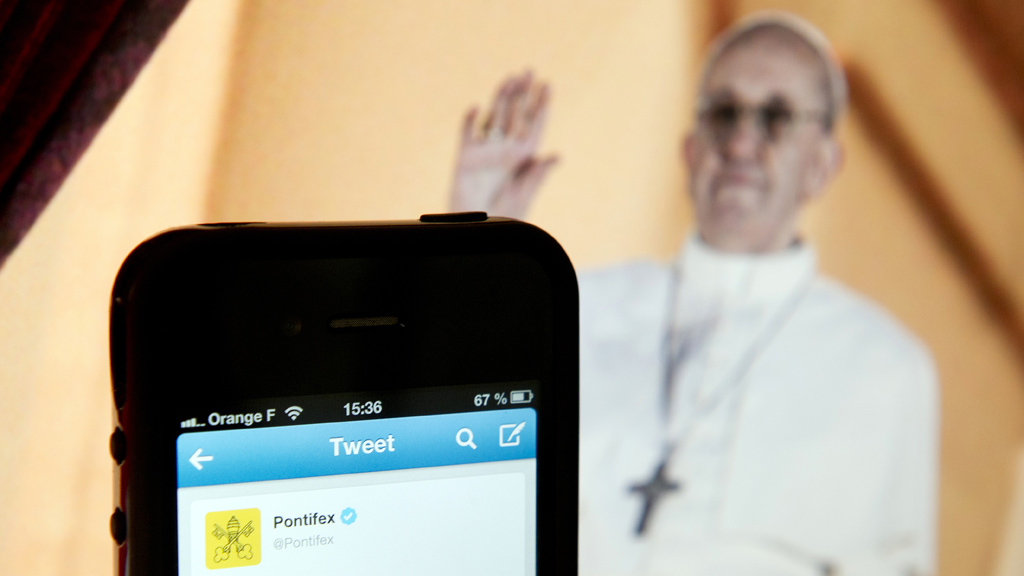And God created HTML: internet fact and fiction
Pope Francis says the internet is a “gift from God” – but who else has claimed rights to the world wide web? And how much of it is true?

In his message, Pope Francis said the internet offered “immense possibilities” to encounter people from different cultural and traditional backgrounds and show solidarity with them.
“This is something truly good, a gift from God,” he wrote.
Truth or myth, depending on what you believe. If you’re a Catholic you believe that man is created by God. So if God created man and man created the internet, then the internet is a gift from God. However, science would argue that man developed from the evolution of the species, so God could not possibly have created the internet.
Vannevar Bush
Vannevar Bush, the presidential science adviser during World War II, first proposed the basics of a hypertext in 1945.
Bush described a theoretical machine he called a “memex,” which was to enhance human memory by allowing the user to store and retrieve documents linked by associations.
Truth or myth? Bush was never directly involved with the creation or development of the internet. He died before the world wide web was inveted, but is often seen as a pioneer.
The Pentagon
The Pentagon created an electronic network in 1969 to keep its communications lines up, even in a nuclear strike. The network was called the Advanced Research Projects Agency Network (or Arpanet).
Truth or myth? Bob Taylor, the Pentagon official who was in charge of the program at the time, said in 2004: “The Arpanet was not an internet. An internet is a connection between two or more computer networks.”
Al Gore
In 1999 the then US vice-president Al Gore made the claim that he was responsible for creating the world wide web.
He told CNN: “During my service in the United States Congress, I took the initiative in creating the internet.”
Truth or myth? What Mr Gore meant was that he was responsible, in an economic and legislative sense, for providing a framework for the internet to grow in the US. However, he was lambasted by the US press for using the word “creating”.
Tim Berners-Lee
Tim Berners-Lee, a British computer scientist, is seen as the father of the world wide web. In 1980 he described the concept of a global system, based on the concept of “hypertext”, that would allow researchers anywhere to share information.
He led the development of the world wide web, the defining of HTML used to create web pages, HTTP and URLs.
Truth or myth? All true. Mr Berners-Lee also created the first web browser and editor and the world’s first website.
Barack Obama
In 2012 President Obama said that business leaders owed the government more money in taxes because it was the state that made their success possible.
He said: “The internet didn’t get invented on its own. Government research created the internet so that all the companies could make money off the internet.”
Truth or myth? There is some truth in President Obama’s statement. For many years, the internet was limited to government and universities. But the internet we use today is arguably the result of tech companies such as Google, Twitter and Facebook.
What the popes have said about the internet:
John Paul II
"We must enter into this modern and every more replete communications network with realism and confidence. If it is used with competence and conscientious responsibility, it can offer useful opportunities for spreading the Gospel message. There is no need, therefore, to worry about putting out to sea in the vast informational ocean."
Pope Benedict XVI
"The web is contributing to the development of new and more complex intellectual and spiritual horizons. In this field too we are called to proclaim our faith. [However] In the search for sharing, for "friends", there is the challenge to be authentic and faithful and not give in to the illusion of constructing an artificial public profile for oneself."
Pope Francis
"This is something truly good, a gift from God. [But] the desire for digital connectivity can have the effect of isolating us from our neighbours, from those closest to us."